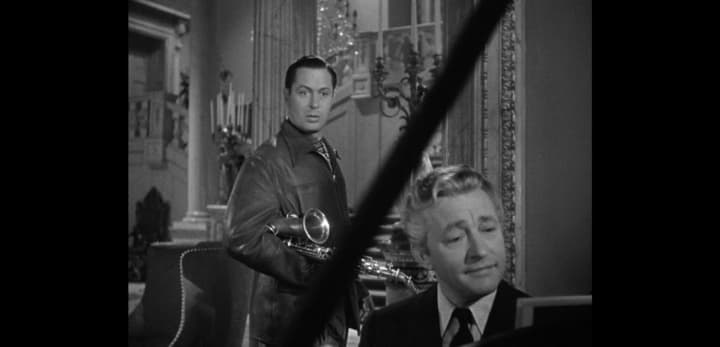Shot of the Movie: Here Comes Mr. Jordan (1941)
divide and conquer . . .

This article is one of a series - Shot of the Movie - and may contain spoilers.
"I'm sorry I keep staring at you like this . . . " - Betty Logan
When it comes to the movie Here Comes Mr. Jordan (1941), this quote is something Betty Logan and I have in common.
The only difference is, while Betty is pulled into Joe Pendleton's eyes, ultimately seeing his soul, I'm pulled into the use of framing employed by director Alexander Hall. And it's so effective, that I'm selecting it for today's Shot of the Movie.
Much like Betty, I see something special beyond the external frame, and I'm intrigued to keep looking at it. I see visual storytelling, and I want to explore every bit of it.
Overview of the Film
Here Comes Mr. Jordan (1941) is based on Harry Segall's play Heaven Can Wait. (Note: Not to be confused with a 1943 movie by the same title, but based on another play.) In this adaptation, a boxer named Joe Pendleton is accidentally taken to Heaven when a "messenger" (AKA angel) claims his soul following a seemingly fatal plane crash. But there's a catch, the crash wasn't really supposed to be fatal. Joe has a full "Karen" moment asking, essentially, to speak to the messenger's manager, which is where we meet the titular, Mr. Jordan.
Mr. Jordan confirms that Joe was supposed to live for another 50 years, so the messenger attempts to take Joe back to his body, only to find he's been cremated.
Trying to right a messy wrong, Mr. Jordan, with peak customer service professionalism, takes over the case, advising he will get Joe a "new body." The two scour the globe in efforts to find one that meets all of Joe's particular characteristics/qualifications.
While the movie has a lot of other twists and turns to the plot, I will leave the synopsis here, as it drops us off nicely at our Context Scene.
Context Scene (Just Before the Shot of the Movie)
After passing up 130 bodies, all across the world, Mr. Jordan brings Joe to the house of Bruce Farnsworth, a wealthy businessman, conveniently residing near Joe's hometown. Mr. Jordan reveals to Joe that Mr. Farnsworth has not yet passed, but will soon. This fact intrigues Joe, as Mr. Jordan previously described Mr. Farnsworth as similarly aged, and not altogether in too bad of shape. Joe openly aspouses some theories as to the man's passing, when Mr. Jordan simply states, "He's being murdered, Joe."
This is the Shot of the Movie.

The Shot of the Movie
Apart from a few moments in this film, a majority of this classic is blocked like a stage play, and it makes sense. The movie was, after all, adapted from a stage play. Most of the time is spent indoors, in the same rooms. Doors are left open, probably for the practical effect of allowing the "supernatural" characters to pass through. The sets are ornate, but few.
This Shot of the Movie is determined to remind us we're not at a play, and it does this by creating the impossible. The impossible, in this case, is an intriguing view that not only wouldn't be possible to see in a stage production, but that also sums up what we know about the characters to this point in the film. To make it more remarkable, it does all this through a simple but clever placement of a prop.
Hall fills the frame with our main players. Joe is standing on the left side of the screen, and Mr. Jordan is sitting at the keyboard of an open-top grand piano on the right side of the screen. From our point of view, Joe and Mr. Jordan are two halves of a connected image, with each of their "worlds" divided perfectly by the stand of the lid for the piano.
It's a great start for visual storytelling. Without saying a word, Hall shows that these two characters are not on the same page. Their worlds are quite literally, divided. The juxtaposition of the shot is further aided by the overly expressive Robert Montgomery (Joe) and the calm, cool, and collected Claude Raines (Mr. Jordan).
Joe is startled that a man is being murdered and more than a little unsettled that he's in the house where it's happening. Mr. Jordan, on the other hand, is aloof, and almost bored with the whole scenario. The murder is a fact, and the fact is trivial to him. Heck, he's absentmindedly flipping through sheet music, just trying to pass the time until the body is ready.
Their expressions and actions are diametrically opposed, yet they are sharing the same space and screen. Though up to this point, the actors had done the heavy lifting in showing the diversity of the characters, all that lifting is picked up by an inanimate object. In a flash, the introduction of the lid stand steals the shot, and seals the deal.
While I tend to focus on the visuals when I decide on a Shot of the Movie, I have to give it up to the dialogue in this scene for knowing how to set the tone. It's certainly worthy of an honorable mention. The movie is a dark comedy, not a popular genre for the time. It's quirky and offbeat in an almost modern sense. The best example of this is the delivery of (particularly of Mr. Jordan's) lines, about a man being murdered by his wife and his secretary. In one breath the movie pivots from comedy into dark comedy territory. While many would probably argue that true dark comedies won't appear until nearly a decade later with movies like Sunset Boulevard (1950), I would argue the groundwork was laid here, in this Shot of the Movie.
About the Creator
Bethany Yoder
Fascinated with the art and science of story-telling, particularly through the lens of film and the magic of subtext.






Comments
There are no comments for this story
Be the first to respond and start the conversation.